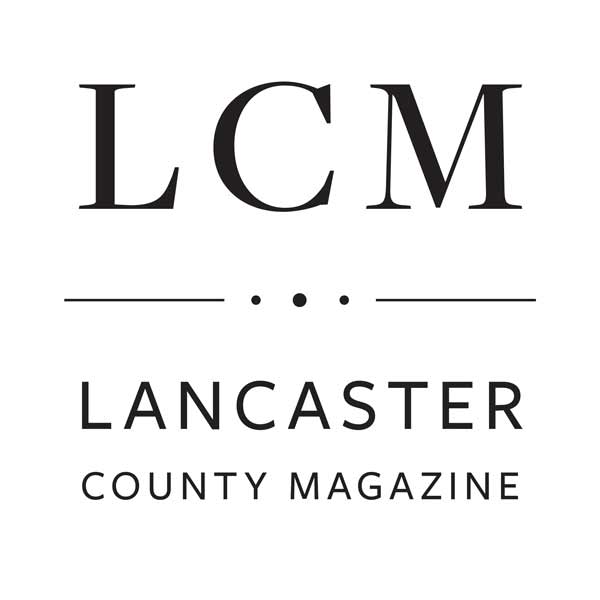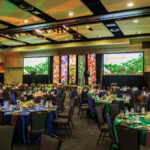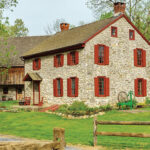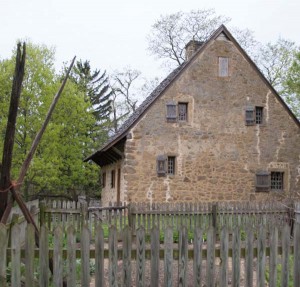Museums and historic sites provide vital links to Lancaster’s past. They also serve as the perfect way to introduce visitors – and perhaps even you – to Lancaster County! You know what they say: Our own backyard is the last to be explored.
Hans Herr House & Museum
Built by Christian and Anna Herr in 1719, the Hans Herr House is regarded as the oldest surviving homestead in the county. It’s also the oldest original Mennonite meeting house still standing in the Western Hemisphere! The museum’s mission is to collect, preserve and interpret artifacts that relate to the history, life and faith of Lancaster’s first European settlers. New to the grounds is a replica Native American longhouse that serves to convey the complete story of life in 18th century Lancaster County. The property is open Monday-Saturday, 9 a.m.-4 p.m., through November 30. Tours of the house and longhouse are offered at various times during the day. 1849 Hans Herr Dr., Willow Street. Details: Call 464-4438 or visit hansherr.org.
Ephrata Cloister
The roots of the Cloister can be traced to Conrad Beissel, an émigré from Germany (1720) who developed a religious theology based upon pietism and mysticism. His followers came to live a cloistered life that demanded self-discipline and encouraged creative expression (the cloister’s distinctive art form – Fraktur – flourished, as did its mesmerizing style of music). Printing and book publishing were also fortes of the Cloister. But, it was not to last; death began to take its toll, and the Cloister began its slow decline. In 1941 the property was sold to the state and is now administered by the Pennsylvania Historical & Museum Commission. The property is open Monday-Saturday, 9 a.m.-5 p.m., and Sunday, 12-5 p.m. 632 W. Main St., Ephrata. Details: Call 733-6600 or visit ephratacloister.org.
Landis Valley Museum
The premise of the museum – to collect, preserve and interpret the history and material cultures of Pennsylvania German life from 1740-1940 – dates to 1925, when brothers Henry and George Landis began inviting visitors to their homestead to view their varied collections. Today, Landis Valley Museum is comprised of 100 acres on which visitors will find a quant village that pays homage to history, tradition, artisanship and agriculture. The museum is also home to the famous Heirloom Seed Project. On July 18, the museum will host an Old-Fashioned Picnic that will feature food, games, a concert by the New Holland Band and more. Monday-Saturday, 9 a.m.-5 p.m., and Sunday, 12-5 p.m., through December. 2451 Kissel Hill Rd., Lancaster. Details: Call 569-0401 or visit landisvalleymuseum.org.
Lancaster History.org (Campus of History)
The campus includes Wheatland, the home of President James Buchanan, the Louise Arnold Tanger Arboretum and the Lancaster County Historical Society. Wheatland’s décor, grounds and gardens are reflective of the Victorian era in which Buchanan lived. The neighboring arboretum was designed by Gustaf Malmorg, who also designed the grounds/gardens of Masonic Village in Elizabethtown. The historical society is home to research facilities and galleries that are devoted to three centuries of history, art and decorative treasures (the Esprit Quilt Collection). Special exhibits are also on view. 230 N. President Ave., Lancaster. Wheatland is open Monday-Saturday, 10 a.m.-4 p.m. The historical society is open Monday-Saturday, with varying hours. The arboretum is open daily, sunrise to sunset. Details: Call 392-4633 or visit lancasterhistory.org.
Lititz Historical Foundation
The Lititz Museum is home to exhibits and artifacts that delve into the history of Lititz, beginning with the Native Americans and continuing with the arrival of Moravian settlers and Lititz’s most famous resident John Sutter. The adjacent Johannes Mueller House is decorated to reflect the lifestyle of a tradesman’s family during the 18th century. Hours are Monday-Saturday, 10 a.m.-4 p.m. 137-145 E. Main St., Lititz. Details: Call 627-4636 or visit lititzhistoricalfoundation.com.
Columbia Historic Preservation Society
Declared by Smithsonian magazine as a “Top 20 Town to Visit” in 2014, Columbia’s history museum shares the fascinating story of this river town that played a pivotal role in the Civil War: The bridge spanning the Susquehanna was intentionally set afire in order to keep Confederate troops from advancing east. A special art and literary exhibit honoring Columbia native and “America’s Greatest Sonneteer” – Lloyd Mifflin – is on view. Saturday and Sunday, 1-4 p.m. Fourth Fridays, 5-9 p.m. 19-21 N. Second St., Columbia. Details: Call 684-2894 or visit columbiahistory.net.
National Clock & Watch Museum
Open since 1977, the museum’s initial 1,000 display items have grown to more than 12,000 (the building housing the museum has grown numerous times as well). The museum, which is the headquarters of the National Association of Watch & Clock Collectors, is home to the largest and most comprehensive horological collection in North America; clocks, tools, watches and other items are from around the world. Special exhibits dot the calendar. On the Clock: Changing the Industrialized World is on display through December. An exhibit dedicated to James Bond’s timepieces recently opened. The National Watch and Clock Museum recently received a TripAdvisor® Certificate of Excellence award, which honors hospitality excellence for establishments that consistently achieve outstanding reviews on TripAdvisor. Summer hours are Monday-Saturday, 10 a.m.-5 p.m., and Sunday, 12-4 p.m. 514 Poplar St., Columbia. Details: Call 684-8261 or visit nawcc.org.
Robert Fulton Birthplace
Robert Fulton (1765-1815) was born in the Southern End of the county. The birthplace of this painter, engineer and inventor of the first steamboat remained in the family until 1772, at which time it was sold. In 1965 it was acquired by the Pennsylvania Historical and Museum Commission, which restored and furnished the home to reflect the era in which Fulton lived. Tours are provided by members of the Southern Lancaster County Historical Society Saturday, 11 a.m.-4 p.m., and Sunday, 1-5 p.m. through Labor Day. 1932 Robert Fulton Highway (Route 222), Quarryville. Details: Call 548-2679 or visit solancastercountyhistory.org.
Rock Ford Plantation
The home of Revolutionary War General Edward Hand is considered to be one of the most important examples of Georgian domestic architecture to survive in the state, and it is regarded as being the most intact building – predating 1800 – in the county. Beautifully furnished, Rock Ford defines refined country living 18th century style. It is believed that George and Martha Washington enjoyed tea at Rock Ford in 1791. Special events dot the calendar; new this year are Second Sunday events. Hours are Wednesday-Sunday, 11 a.m.-3 p.m. 881 Rock Ford Rd., Lancaster. Details: Call 392-7223 or visit rockfordplantation.org.
Historic Lancaster Walking Tour
Downtown Lancaster oozes history, plus its architecture is renowned. The best way to see it all is on foot. Tours, which have been offered since 1976, depart daily at 1 p.m., plus at 10 a.m. on Tuesday, Friday and Saturday, from the lobby of the Penn Square Marriott (look for the costumed guides). Details: Call 392-1776 or visit historiclancasterwalkingtour.com.
1852 Herr Family Homestead
Originally a 92-acre farm that sat on the edge of Landisville, the homestead was owned by generations of Herrs beginning in 1844. Its first resident was Henry Herr, who is a descendent of Hans Herr. He was succeeded by his son Amos B. Herr. The third and last owner was Amos R. Herr, who took over the farm after his father’s death in 1926. Amos R. not only managed the farm, but he was also an educator and community leader. When Amos R.’s wife, Ethel, died in 1964, her husband donated 55 acres to East Hempfield Township for community use. When he passed away in 1987, the rest of the tract was donated as well, thus paving the way for the creation of Amos Herr Park. The house sat empty until 1990, at which time a committee was formed to find a suitable use for the house (1852) and barn (1850). Committee members deemed the property a perfect example of a Victorian-era farmstead and proposed that it be used as a historic site. Furnishings that are original to the house, donated items, farming implements and volunteer-tended gardens have ensured that the Herr Homestead will continue to educate and entertain visitors. The house and gardens are open Saturday and Sunday, 1-4 p.m., through October. 1756 Nissley Rd., Landisville. Details: Call 898-8822 or visit herrhomestead.org.
Mount Joy Area Historical Society
The organization’s mission is to “seek, preserve and make available” history relating to the Mount Joy area, which was originally settled by the Scots-Irish. Located in the former Macedonia AME Church, the building houses the various collections that relate to the area’s history. The building is open Sundays, 1-4 p.m. 120 Fairview St., Mount Joy. Details: Call 653-4718 or visit mountjoyhistory.com.
Winters Heritage House Museum
The Elizabethtown area is noted for its treasure trove of log structures, and the museum exemplifies that fact as it makes its home in three log structures that date from 1750 to 1847, as well as a Victorian- era building that dates to 1877. Inside collections and activities (for all ages) ensure that residents will stay connected to the history of the area. The museum is open Wednesday, Thursday and Friday, 9:30 a.m.-3 p.m. 33-47 E. High St., Elizabethtown. Details: Call 367-4672 or visit elizabethtownhistory.org.
Cocalico Valley Historical Society
The history of northern Lancaster County is on view at the Connell Mansion, which was built in 1868 and is regarded as a fine example of Victorian-Italianate architecture. The historical society grew out of a project launched by the Ephrata Recreation Center in 1957. The museum’s collections were either made in the Cocalico Valley or are representative of items that would have been used by its residents over the centuries. The current exhibit, The Musselmans of Murrell, tells the story of pioneer (1920s) dealers of Pennsylvania German and Early American antiques who counted some of the country’s most famous collectors as their clients. The museum is open Saturdays, 10 a.m.-4 p.m. 237 W. Main St., Ephrata. Details: Call 733-1616 or visit cocalicovalleyhs.org.
Mascot Roller Mills/Ressler Home
Regarded as one of the country’s best preserved flour mills, Mascot Roller Mills’ history extends back to the 1730s, when it was built by Jacob Bear. In 1865 it was taken over by William Ressler. Two more generations of Resslers – Jacob and Franklin – operated the water-powered mill until it closed in 1977. The Ressler home is also open to the public; its décor is reflective of a miller’s house during the 19th century. The Ressler Mill Foundation funded the creation of the nearby William Morton Bird Sanctuary that is perfect for picnics, birdwatching and fishing. It also funds projects that improve Mill Creek and supports various educational institutions/projects in Lancaster County. The property is open Monday-Saturday, 10 a.m.-4 p.m., through October 17. 433 W. Newport Rd., Ronks. Details: Call 656-7616 or visit resslermill.com.
Conestoga Area Historical Society
Did you know that Pequea (Martic Township) was once home to a nationally renowned hotel – River View – that was dedicated to healthy living and attracted visitors from near and far during the 19th and early 20th centuries? Thanks to the Conestoga Area Historical Society, Pequea’s moment of fame is well documented with photos and memorabilia from the hotel, which offered guests access to 500 acres of woodland and water. Now celebrating its 25th anniversary, the historical society is home to a variety of collections that took root through items that were donated by the area’s generous citizens. The grounds of the historical society are home to seven buildings that serve as living-history museums. The tobacco shed (circa 1800s) is home to the society’s Conestoga Wagon. This year’s exhibit, Threads and Inks, focuses on antique clothing and paper documents from the society’s permanent collections. The property is open Saturday and Sunday, 1-4 p.m. 51 Kendig Rd., Conestoga. Details: Call 872-1699 or visit pennmanorhistory.org.






SHARE
PRINT